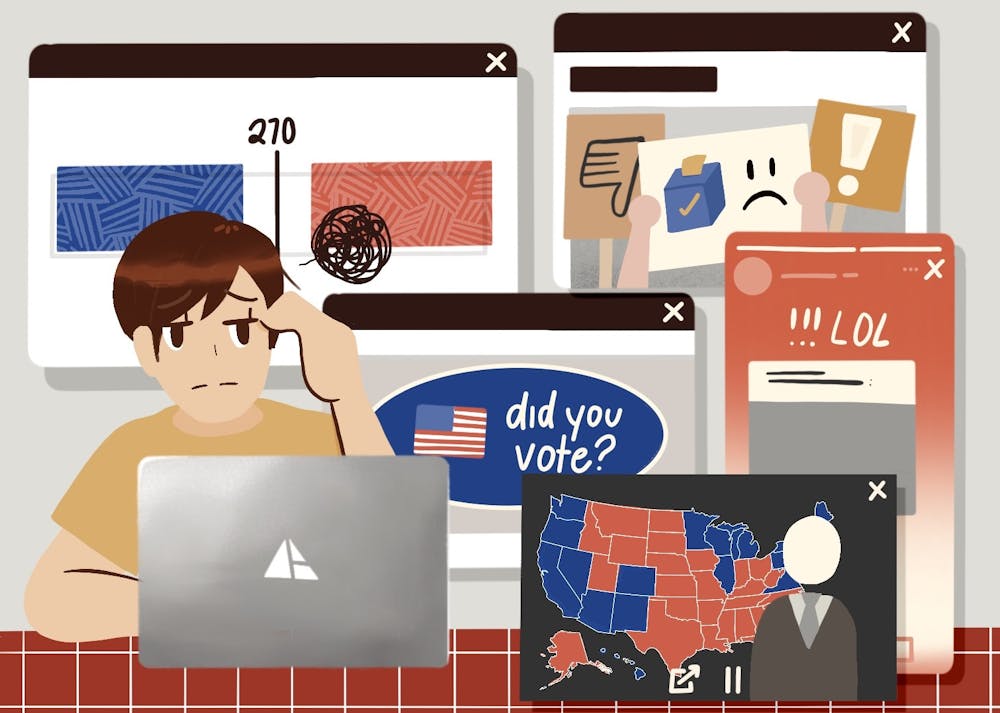ASU students were feeling election season nerves amplified by results being delayed due to the contested nature of multiple races in Arizona.
Election night jitters are not unique, but students seem to be particularly susceptible to an increase in stress and anxiety as election season comes to an end.
Students report rising stress surrounding recent elections
On election night, freshman nursing student Emily Sargent said she was "trying to stay calm" while watching the results roll in. She said that she felt stressed about the uncertainty of the results, saying she didn't "really know which way" the election would swing.
Danielle Du, a junior studying medical studies, also felt the stress related to the high stakes and uncertainty heading into the election.
"It's just the uncertainty of where we are going next," Du said. "It's not going to be an earth-shattering change but just the knowledge that there is going to be change in the future."
Later that night, Du said she made the decision to step back from watching the election results slowly come in.
"For my own mental health I should take a step back and not every two minutes be like 'Refresh, refresh,'" Du said.
In a study following the 2016 election, ASU students enrolled in psychology courses were asked about their stress response to the election using the Impact of Event Scale.
According to the U.S. Department of Veterans Affairs, the Impact of Event Scale "assesses subjective distress caused by traumatic events."
The survey found that one out of every four students surveyed showed clinically significant event-related distress regarding the 2016 election.
Leah Doane, an associate professor of psychology at ASU who worked on the study, said college-aged people, in particular, were impacted and the stress brought on by the 2016 election crossed over into other parts of students' lives.
"It's also bleeding into other domains of their life, either their family life, romantic partnerships or friendships," Doane said. "We really need to focus on those populations who are continuing to experience stress associated with that particular event, long after the event is over."
For the 2020 election, the American Psychological Association said the stress people felt only increased.
According to a survey conducted before the 2020 election, 68% of U.S. adults said that "the 2020 U.S. presidential election is a significant source of stress in their life," an increase from 52% reported in 2016.
However, the election is not the only source of Americans' anxieties. Election Day comes after months of living through a pandemic.
"Everything is compounded because of COVID-19," Doane said. "It really seems that COVID-19 has changed the game, primarily for college students and young adults, due to the fact that this doesn't feel stable."
Lois Brown, the director for the Center for the Study of Race and Democracy and a foundation professor of English, emphasized the impact the "pandemics of racial inequality, racism" and COVID-19 is having on students, compounding to the stressors of the election.
"(It) has marbled into a collective national sense of urgency and anxiety around polarization, division, uncertainty," Brown said.
ASU community looks to address its anxieties
ASU schools and organizations hosted various events after Election Day, offering a range of activities, from Zoom rooms where students could pop in and discuss their thoughts to events such as yoga and Netflix watch parties serving as a reprieve from the election.
Aldwin Galang, a graduate student studying nursing, hosted a mindfulness event with Undergraduate Student Government Downtown the day after the election called "Managing Post-Election Stress."
"The main point of this event is to just provide resources and a community of care amongst students and the community," Galang said.
Galang said he focused on mindfulness and meditation to help students "decrease their stress level, improve their mood and also increase their performance."
Jeanne Colquette, an events coordinator for the School of Social Transformation, helped put on an event on Nov. 4 called "SSTea Post-Election Conversation," where faculty and students came together to talk about how they were feeling in terms of the election and current events.
"Pretty much everyone who I hear from, whether they are a political person or not, is really stressed about the election because it really makes a difference," Colquette said.
Despite the polarized state of the election, Doane said she hopes people can work past the divisions.
"They’re going to be some folks who are happy and some folks who are not," Doane said. "(We need) to come back to this idea that we all share a community together."
Reach the reporter at mcfisch4@asu.edu and follow @morgfisch on Twitter.
Like The State Press on Facebook and follow @statepress on Twitter.

Morgan Fischer is the politics editor, she works with her desk to cover topics related to politics in the ASU community. She has previously worked as an intern for RightThisMinute.




